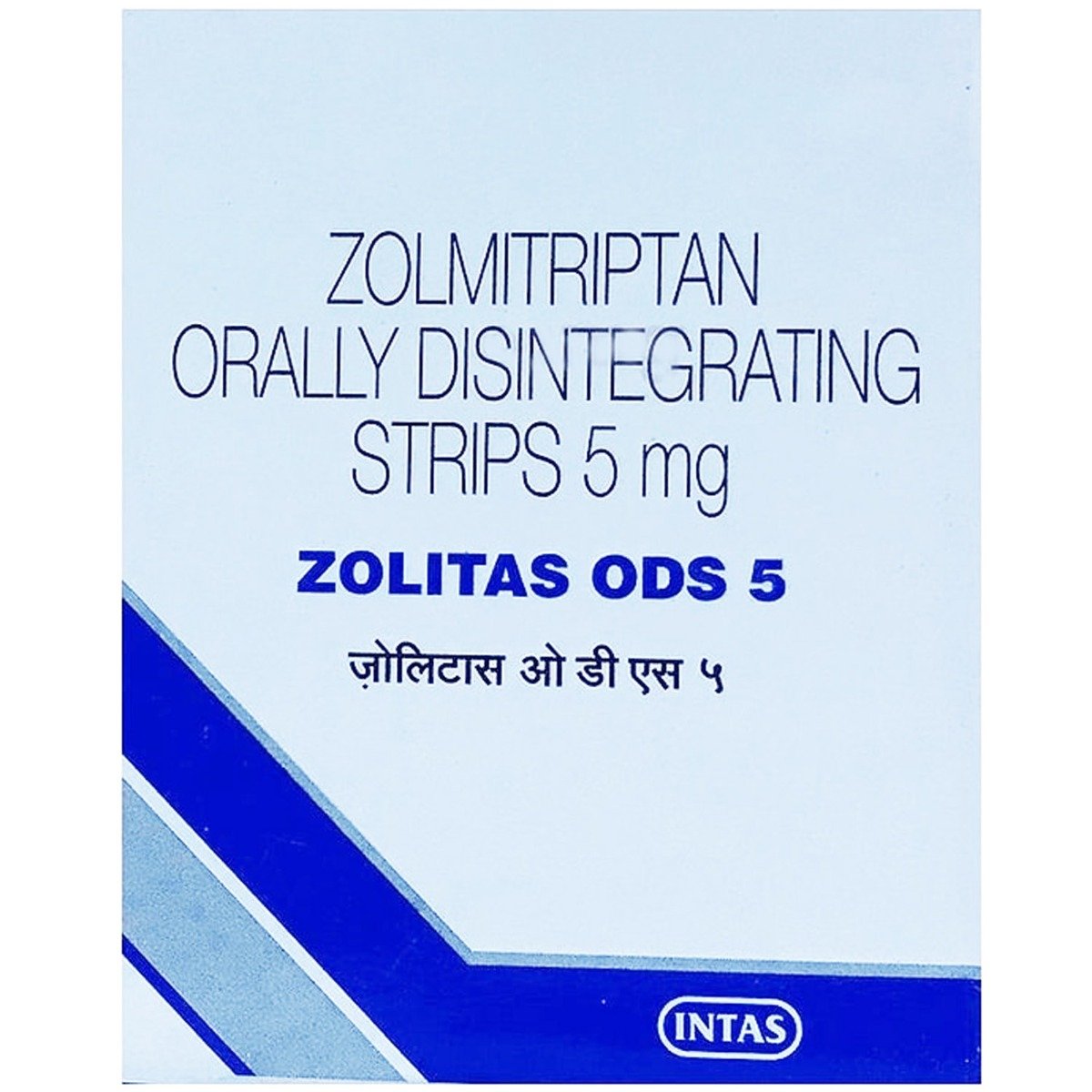Zolmitriptan
About Zolmitriptan
Zolmitriptan belongs to a class of drugs known as 'antimigraine' used to prevent migraine symptoms such as headache, nausea, and vomiting. Migraine is a neurological condition characterized by intense pulsating, throbbing, pounding, debilitating headache, which usually occurs on one side of the head; however, it can occur on both sides or shift. Hormonal changes, stress, bright lights, loud sounds, and certain foods and drinks can trigger migraine headaches.
Zolmitriptan contains Zolmitriptan. It works by constricting blood vessels around the brain, preventing pain signals from reaching the brain, and preventing the release of certain natural substances that cause pain, nausea, and other migraine symptoms.
Take Zolmitriptan as prescribed by your doctor. You are advised to take Zolmitriptan for as long as your doctor prescribes it. In some cases, you may experience certain common side effects such as dizziness, sleepiness, nausea, chest discomfort, dry mouth, irregular heartbeats and heartburn. Most of these side effects do not require medical attention and will resolve gradually over time. However, you are advised to talk to your doctor if you experience these side effects persistently.
If you are allergic to any of the ingredients in Zolmitriptan, do not take it. Inform your doctor if you have had any kidney or liver problems, ischemic heart disease, hyperlipidemia (high amounts of fat), menopausal dysfunction, obesity, smoking, cerebrovascular illness, or heart disease. Unless otherwise prescribed, do not use Zolmitriptan if you are pregnant or breastfeeding. Zolmitriptan may cause drowsiness and fatigue, so drive only if you are alert. Zolmitriptan should not be given to children because its safety and effectiveness have not been proven. Drinking alcohol while taking Zolmitriptan may cause drowsiness.
Uses of Zolmitriptan
Medicinal Benefits
Zolmitriptan contains Zolmitriptan (anti-migraine medication), which is used to prevent migraine symptoms such as headaches, nausea and vomiting. It works by constricting blood vessels around the brain, preventing pain signals from reaching the brain, and preventing the release of certain natural substances that cause pain, nausea, and other migraine symptoms. Thus, Zolmitriptan helps effectively in treating symptoms of migraine-like headache, nausea and vomiting.
Directions for Use
Storage
Side Effects of Zolmitriptan
- Dizziness
- Sleepiness
- Nausea
- Fatigue
- Chest discomfort
- Dry mouth
- Irregular heartbeats
- Heartburn
- Feeling tired
- Stomach upset
- Tingling and numbness in hands and feet
- Sweating
- Hallucinations
- Fast heart rate
Drug Warnings
Do not take Zolmitriptan if you are allergic to any of its contents. Inform your doctor if you have had any renal or liver problems, ischemic heart disease, hyperlipidemia (high levels of fat), menopausal disorder, obesity, smoking, cerebrovascular disease, and heart disease. Do not use Zolmitriptan if you are pregnant or breastfeeding unless prescribed. Zolmitriptan may cause drowsiness and tiredness, so drive only if you are alert. Zolmitriptan should not be given to children as safety and effectiveness have not been established. Avoid consuming alcohol along with Zolmitriptan as it could lead to increased drowsiness.
Drug Interactions
Drug-Drug Interactions: Zolmitriptan may have interaction with to relieve headache, pain, and other migraine symptoms (e.g. frovatriptan), anti-depressants (e.g. duloxetine, amoxapine, doxepin), medicines used for treating nerve pain (nortriptyline), antiemetic drugs (e.g. ondansetron) and painkillers (e.g. tramadol).
Drug-Food Interactions: Avoid the consumption of alcohol, smoking and caffeinated products. Do not consume grapefruit while taking Zolmitriptan.
Drug-Disease Interactions: Zolmitriptan may interact with people with various disease conditions, including renal or liver problems, ischemic heart disease, hyperlipidemia (high levels of fat), menopausal disorder, obesity, smoking, cerebrovascular disease, and heart disease.
Drug-Drug Interactions Checker List:
Safety Advice

Alcohol
unsafeAvoid consumption of alcohol while taking Zolmitriptan as it may increase drowsiness.

Pregnancy
cautionZolmitriptan should be used during the first and second trimesters of pregnancy only if the benefits outweigh the risks. Zolmitriptan should not be taken during the third trimester of pregnancy.

Breast Feeding
cautionZolmitriptan may pass into breast milk and harm the baby. Please consult your doctor before taking Zolmitriptan, and your doctor will decide whether Zolmitriptan can be taken by breastfeeding mothers or not.

Driving
cautionZolmitriptan may cause dizziness, weakness and drowsiness. Do not drive or operate machinery unless you are alert.

Liver
cautionDose adjustment may be needed in patients with liver impairment. Please consult your doctor if you have a liver impairment or any concerns.

Kidney
cautionDose adjustment may be needed in patients with kidney impairment. Please consult your doctor if you have kidney impairment or any concerns.

Children
unsafeZolmitriptan should not be given to children as the safety and effectiveness were not established.
Habit Forming
Diet & Lifestyle Advise
- Perform meditation and yoga. This helps in relieving stress and provides relaxation. Follow a regular sleep pattern to improve the amount and quality of sleep you get. Massage your scalp to ease the pain.
- Lie down in a quiet, dark room. Place a cold cloth over your forehead or neck.
- Avoid smoking, alcohol and caffeinated drinks. Stay hydrated. Drink plenty of fluids. Maintaining a healthy diet and exercising regularly helps improve overall health and boost self-esteem.
- Learn what triggers your migraine and try avoiding them. Learn relaxation skills as they help in reducing stress.
- Avoid bright lights, loud noise and extreme temperatures.
Special Advise
- Constantly monitor your blood pressure while taking Zolmitriptan.
Patients Concern
Disease/Condition Glossary
Migraine: It is a neurological condition that is characterized by an intense, debilitating headache. Hormonal changes, stress, lack or excess of sleep, bright lights, loud sounds, and certain foods and drinks can trigger migraine headaches. Warning symptoms precede migraine headache one or two days before the headache itself. The warning symptoms include food cravings, depression, fatigue, hyperactivity, irritability and neck stiffness. Symptoms of migraine include throbbing pain in one particular area with varying intensity, nausea, vomiting, numbness or tingling sensation, difficulty speaking, and sensitivity to sound and light.
FAQs
Zolmitriptan belongs to a class of drugs known as 'antimigraine', containing Zolmitriptan, which works by acting on the serotonin (5-HT) receptors located in the brain, thereby causing narrowing of the brain's blood vessels, which in turn affects the blood flow patterns associated with headache. Thus, Zolmitriptan prevents symptoms of migraine-like headache, nausea and vomiting.
Dry mouth could be a side-effect of Zolmitriptan. Limiting caffeine intake, avoiding smoking and mouthwashes containing alcohol, drinking water regularly, and chewing sugar-free gum/candy might help stimulate saliva and thereby prevent drying of the mouth.
Zolmitriptan treats a headache that has already begun but does not prevent or reduce the attacks. Zolmitriptan should not be used to treat cluster headaches or other types of headaches, which may cause loss of movement on one side of the body.
Yes, Zolmitriptan can cause an increase in blood pressure in some cases. So, while taking Zolmitriptan, constantly monitor your blood pressure to avoid any sudden increase in blood pressure.
Several factors like caffeine withdrawal, changes in hormone levels during menstruation or with the use of birth control pills, changes in sleep patterns, drinking alcohol, missing meals or smoking, other physical stress, loud noises or bright lights, odours or perfumes or exposure to smoke and stress and anxiety may trigger a migraine attack.
No, it is advised not to take both medicines together to avoid unpleasant side effects. Inform your doctor if you are taking depression medicine before starting Zolmitriptan.
No, Zolmitriptan is used to treat headache pain during a migraine attack, not to stop the pain from coming on.







